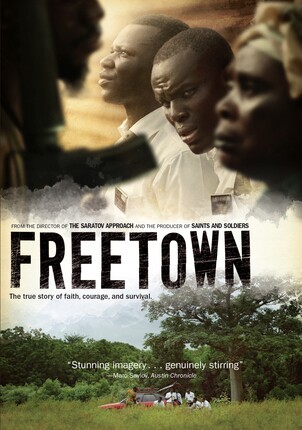Freetown, like director Garrett Batty’s previous film, The Saratov Approach, will sufficiently terrify all mothers wanting to send their kids on a mission. It’s by no means a perfect film. It’s not even a great film. But it definitely is a good film, and an ambitious one at that, with beautiful scenes and a rather engaging story. The very fact that a small band of Utah filmmakers pulled off shooting a feature narrative in Africa, while also trying to tackle difficult subject matters that many of us would rather not face, is quite remarkable and worth the watch. Truth be told, it’s also the first time I’ve ever watched a film and had to google the words “cognitive dissonance.”
This is a story taking place in Africa with black missionaries, and director Garrett Batty doesn’t shy away from tackling the proverbial elephant in the room: blacks and the priesthood. But it’s not the focus of the film. It’s something that anyone watching the film will definitely be thinking about, and Batty wisely brings it up and moves on to the real story.
Watch this faith-inspiring new film today, available for purchase at Deseret Book stores and on deseretbook.com.
However, when the moment does come, it’s as if a cerebral bomb is dropped on the audience. You can almost feel the room go quiet, even if you’re the only one in it, because the word choice just really puts it all out there, “Why would His organization, which is truly lead by a Prophet, have such a racist policy?”
It’s a question I, and many others, have been confronted with while investigating the Church. Except it went something more like this for me: “What does your mom think about you joining the Church?” Which was code for, “Your mom was in the Civil Rights Movement and Mormons don’t like black people, so what’s up with that?” This is that cognitive dissonance I was talking about wherein you have two conflicting belief or thoughts.
Over the years I’ve tried to explain it away by saying things like, “Well, you know there are actually more people of color than white members in the Church,” and other such nonsense but deflections and justifications didn’t actually resolve that dissonance for me. It’s like wooly mammoths and the pyramids of Egypt. They both existed at the same time and while I can sit there and look at the facts I still find it hard to comprehend them.
My mother struggled with similar issues when she was a child. She believed in the Declaration of Independence and the principles upon which our nation was founded, including that all men are created equal, but could walk outside her door and see that wasn’t true. The history of our nation was very clear no matter how we tried to skirt around it.
The same can be said for the Church as well, and I believe we’re working on cleaning out some of our closets. It’s not easy and it can be uncomfortable, but that’s okay. Dr. King once said, “The arc of the moral universe is long but it bends towards justice.” We might not get things 100% right from the start, but we'll get there and be better for it.
While the question posed by the character in Freetown was both challenging and intriguing, his own answer was even more profound: “God allows us to change. He wants us to change.” Jesus Christ atoned for all of our sins. We need to recognize them, repent, and work to never repeat them.
Give Freetown a chance. And if possible, watch it with other people with the intent of having an open and honest discussion about it afterward. There are a lot of layers to this film, even it if takes a while to get to all of them (the film could've used a bit more editing). But in the end you'll find that watching the film was both a rewarding and enriching experience.
Loki Mulholland, a convert to the LDS Church, is the award-winning filmmaker behind the documentary An Ordinary Hero and the son of Civil Rights legend, Joan Trumpauer Mulholland. He currently resides in Lehi, Utah and is in production on his next film, The Uncomfortable Truth, about white supremacy in America and his own family’s complicity in it.
Watch the preview for Freetown here.


